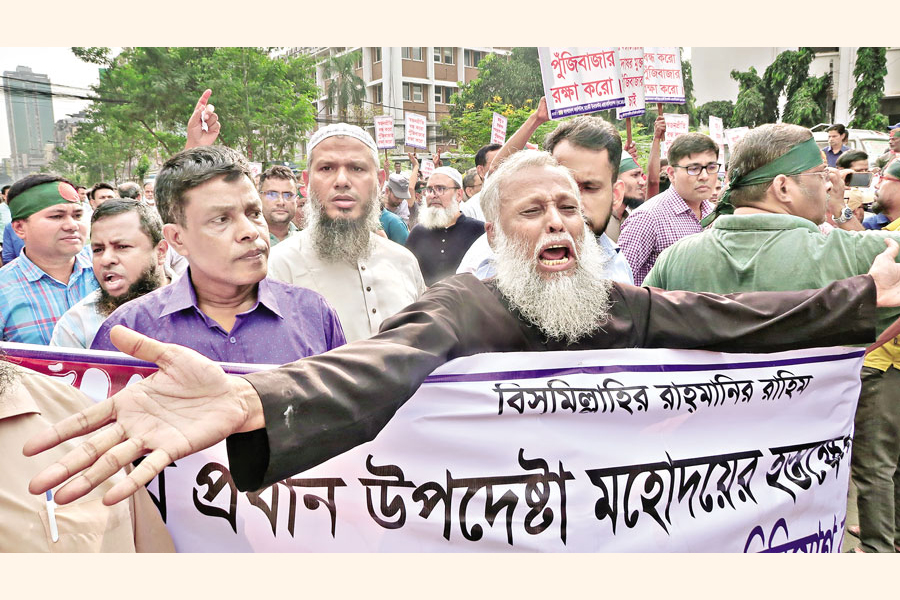Stocks in free fall amid political uncertainty, rising interest rates
Experts also blame some hasty and uncoordinated actions on the part of securities regulator

Published :
Updated :

 The key index of the Dhaka Stock Exchange (DSE) tumbled below 5,000 points on Sunday after four years amidst political uncertainties and an increase in the policy rate designed to tame soaring inflation.
The key index of the Dhaka Stock Exchange (DSE) tumbled below 5,000 points on Sunday after four years amidst political uncertainties and an increase in the policy rate designed to tame soaring inflation.
Market analysts also blame regulatory measures taken in the absence of coordination between stakeholders for the gloomy market situation. Rising interest rate following intermittent hikes in policy rate to 10 per cent over the last couple of months is another major reason for the market's plunge.
"The overall macroeconomic situation and policy rate hikes are not in favour of the stock market," said Faruq Ahmad Siddiqi, former chairman of the securities regulator.
The growing deposit rates are prompting savers to move away funds to the money market from the stock market. Persistent price erosion of stocks also led to a mounting sell pressure from margin accounts, exacerbating the fall of the index.
On Sunday, stocks experienced the biggest single-day fall in 43 months, prompting some investors to take to the streets in protest.
Referring to the formation of the exchanges' boards without any consultation with the bourses, Mr Siddiqi said the securities regulator must have discussions with stakeholders before taking any decision.
"I think nothing is being done through a coordinated effort."
"The regulator definitely is doing the right thing, aiming to remove corruption and irregularities. But it will not be rational if it wants to do so within a short span of time.
"The regulator must take measures, but the market situation should be taken into account," added Mr Siddiqi.
A slowdown in business activities amid lingering macroeconomic challenges and lower-than-expected corporate earnings also dampened investor sentiment.
The Bangladesh Securities and Exchange Commission (BSEC) formed a task force for giving recommendations for the market's development. It has also formed a good number of inquiry committees and imposed a record penalty worth Tk 4.28 billion on October 1 on nine individuals and institutions for manipulating the share price of Beximco.
Some other measures, including the transfer of a large number of companies to the junk category in a single day left a negative impact on the market, said Mr Siddiqi. "Such decisions should be taken in consultation with stock exchanges."
Usually, the market tends to weaken when interest rates rise and funds are diverted to the money market from the stock market. Until the interest rate comes down to a rational level, investors will not invest heavily in stocks.
On Sunday, investors continued their selling spree as they saw no immediate remedy from the bleak market outlook.
Substantial price erosion of large-cap stocks dragged the Dhaka Stock Exchange (DSE) by more than 149 points or 2.91 per cent to 4,965, the lowest since December 2, 2020.
The DSEX shed over 276 points in the past three sessions while the market shrank by Tk 136 billion during the time.
EBL Securities said the grim market outlook and not-so-good earnings of businesses during the July-September quarter narrowed the possibility of a market rebound within a short time.
Against the backdrop, the market watchdog formed a four-member committee on Sunday to investigate the sharp index fall and submit a report within 10 working days.
The BSEC in a statement said the downward market movement was "unusual and suspicious". Investigators will find out reasons behind the market fall and identify people involved in spreading rumors in the market, reads the statement.
After the ouster of the Hasina-led government on August 5, the market surged for four trading days in a row and the key index went up to 6,016 points on August 11.
Since then, the index has been eroded by more than 1,051 points or 17 per cent while the market capitalisation has been reduced by Tk 662 billion.
In the meantime, the newly-appointed BSEC chairman has been striving to ensure transparency and accountability in the market.
Five large-cap blue chip stocks -- Islami Bank, Renata, British American Tobacco, Square Pharma, and Grameenphone -- largely contributed to the index plunge on Sunday. They jointly accounted for erosion of 46 points of the DSEX.
DS30 index, a group of 30 prominent companies, lost 46 points to 1,831 while DSES index, which represents Shariah-based companies, shed 36 points to 1,108.
The number of beneficiary owners' accounts fell by more than 0.12 million to 1.65 million in just four months to October 24, according to the Central Depository Bangladesh Ltd (CDBL).
Turnover, a crucial indicator of the market, was Tk 3.04 billion on Sunday, down further from Tk 3.06 billion the day before.
All the sectors faced selling pressure. Out of 396 issues traded, 341 declined, 29 advanced and 26 remained unchanged.
Lovello Ice-cream was the most-traded stock with shares worth Tk 149 million changing hands, followed by Grameenphone, NRB Bank, Islami bank, and Fareast Knitting & Dyeing.
Among the major sectors, non-bank financial institutions saw the highest correction of 5.84 per cent. It was followed by telecom, engineering, food, pharma, banking and power.
The Chittagong Stock Exchange (CSE) also nosedived with the CSE All Share Price Index (CASPI) shedding 296 points to settle at 14,006 and its Selective Categories Index (CSCX) lost 180 points to 8,525.
babulfexpress@gmail.com


 For all latest news, follow The Financial Express Google News channel.
For all latest news, follow The Financial Express Google News channel.